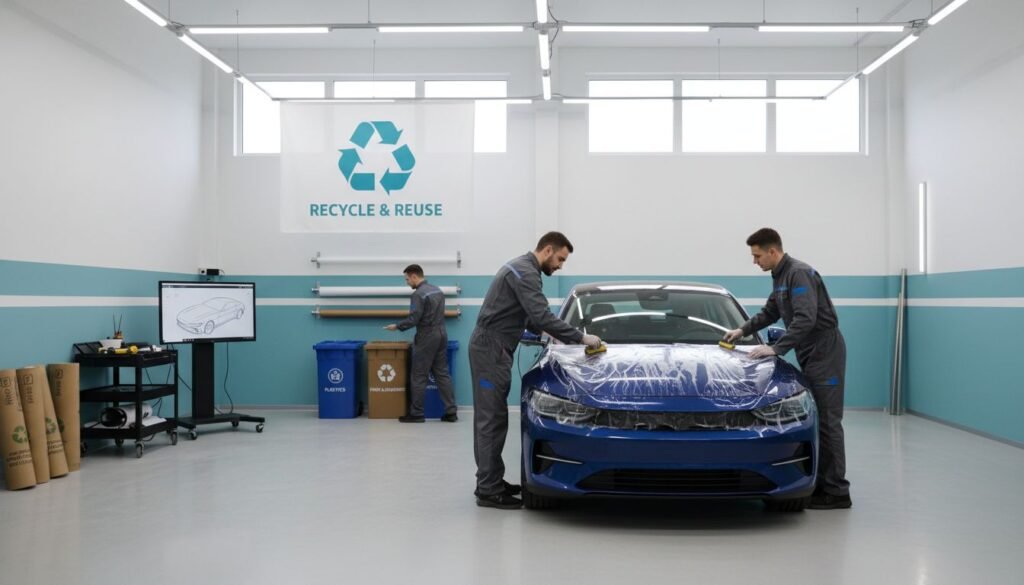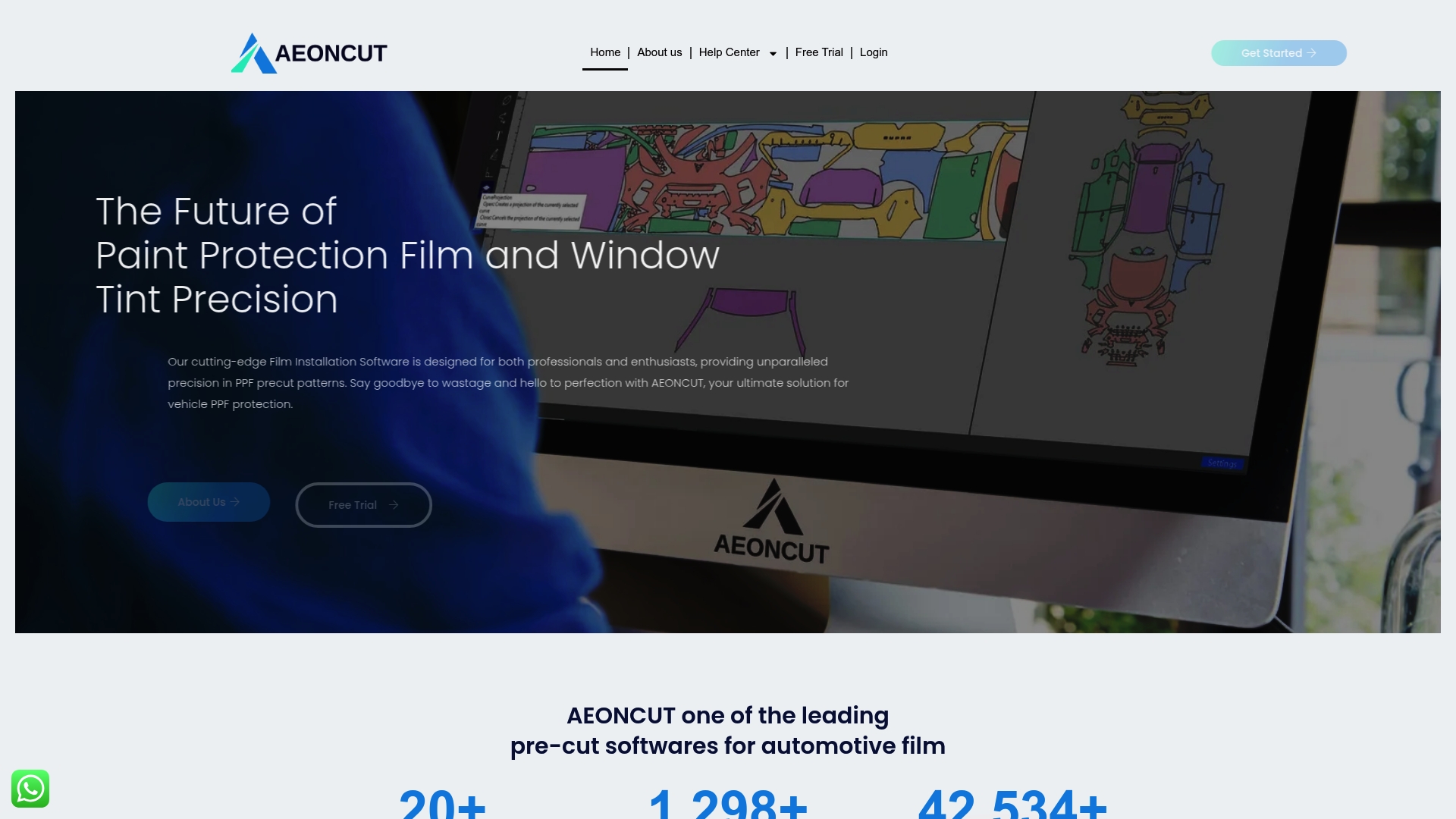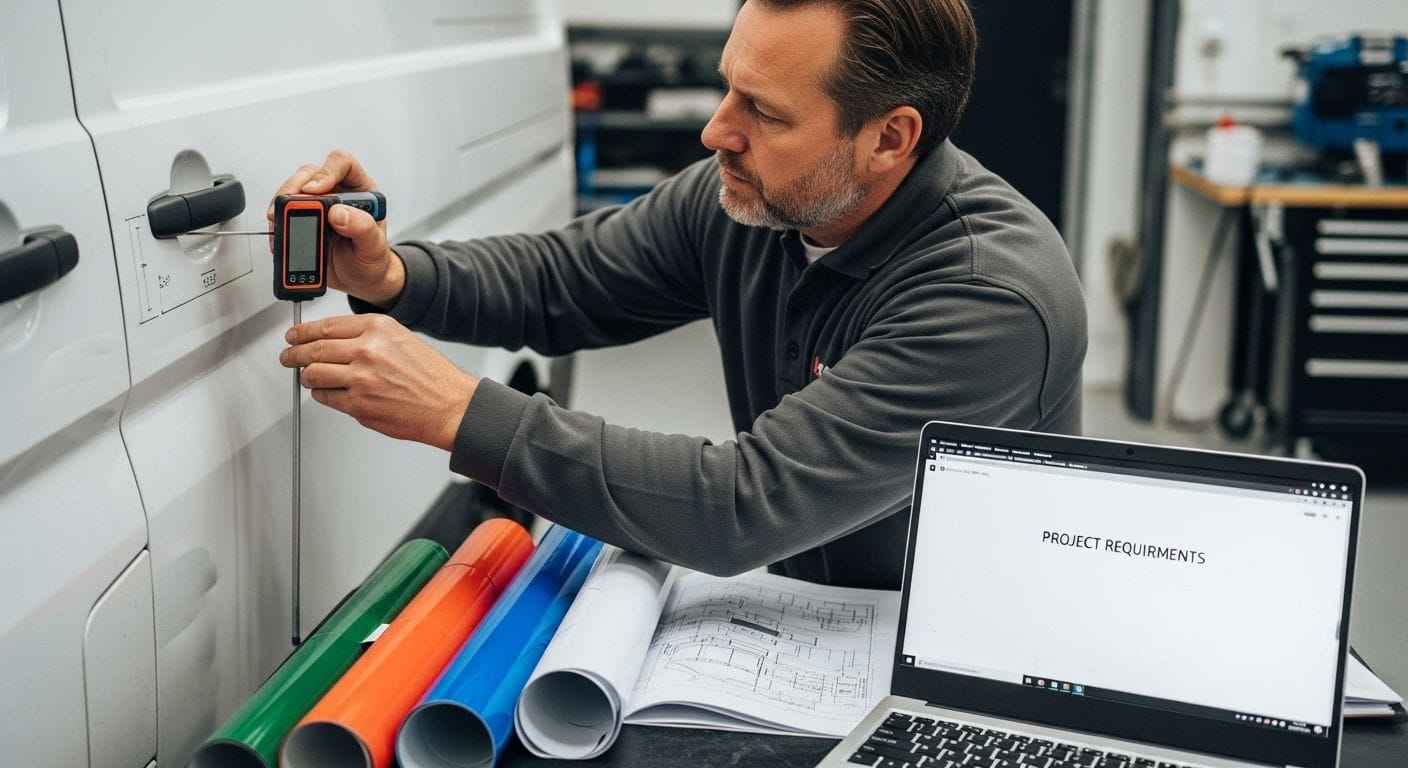
Did you know that more than 70 percent of consumers say they would pay extra for products from environmentally responsible companies? Green business practices are no longer just about good intentions, they shape the reputation and growth potential of every industry. For automotive customisation professionals, real sustainability means taking action that saves resources and protects the planet, not just making bold claims or eye-catching labels.
Table of Contents
- Defining Green Business Practices And Misconceptions
- Types Of Green Initiatives For Auto Film Businesses
- Implementing Sustainable Operations And Materials
- Regulatory Compliance And Environmental Standards
- Cost, Savings, And ROI Of Eco-Friendly Changes
Key Takeaways
| Point | Details |
|---|---|
| Integration of Sustainability | Green business practices balance environmental sustainability with financial performance, requiring actionable strategies in operations. |
| Avoiding Greenwashing | Genuine environmental claims demand transparency and verifiable standards, while companies need to critically evaluate and choose credible suppliers. |
| Operational Efficiency | Sustainable operations enhance resource efficiency through precise material management and energy-saving practices, leading to cost reductions. |
| Compliance and Trust | Understanding environmental regulations is essential for credibility; compliance enhances customer trust and positions businesses as responsible leaders in the industry. |
Defining Green Business Practices and Misconceptions
Green business practices represent a strategic approach to corporate operations that prioritise environmental sustainability alongside financial performance. According to the International Labour Organization, green businesses fundamentally “integrate sustainability principles into their decisions to minimise environmental impact, balancing profit with planetary health”.
In the automotive customisation industry, green practices go beyond mere marketing rhetoric. They involve concrete actions like reducing material waste during vehicle wrapping and paint protection film (PPF) installation, selecting eco-friendly products, minimising chemical usage, and implementing energy-efficient workflows. Sustainability in this context isn’t just an abstract concept but a tangible operational strategy that directly impacts resource consumption and environmental footprint.
Recognising and Avoiding Greenwashing
However, not all environmental claims are genuine. PBS highlights a critical concern: greenwashing, where companies misleadingly portray their practices as environmentally friendly without substantive change. For professional installers, this means:
- Critically evaluating product environmental claims
- Demanding transparent supply chain information
- Choosing manufacturers with verifiable sustainability credentials
- Understanding the actual environmental impact of materials and processes
True green business practices require commitment, transparency, and measurable outcomes. They represent a holistic approach to business that recognises environmental responsibility as integral to long-term success, not just a marketing strategy.
Types of Green Initiatives for Auto Film Businesses
Green initiatives for auto film businesses represent strategic approaches to reducing environmental impact while maintaining operational efficiency. According to Guides Library of Congress, businesses can adopt sustainable practices by “using sustainable materials, implementing energy-efficient processes, and reducing waste to enhance sustainability”.
Material and Resource Management
For automotive film professionals, green initiatives centre around several key areas of operational transformation. Sustainable material selection becomes paramount, focusing on eco-friendly films, low-VOC chemicals, and recyclable packaging. This might include:
Here’s a summary of key green initiatives for auto film businesses:
| Area of Focus | Key Green Practices | Expected Benefits |
|---|---|---|
| Material Selection | Eco-friendly films Low-VOC chemicals Recyclable packaging | Reduced environmental impact Improved brand reputation |
| Resource Management | Precision cutting Biodegradable protective films Water-based adhesives | Less waste Lower material costs |
| Energy Efficiency | Efficient equipment Optimised workflows | Lower energy bills Reduced emissions |
| Supplier Choice | Verified environmental credentials Sustainable sourcing | Transparent operations Stronger supply chains |
- Sourcing PPF and window tint materials from manufacturers with verified environmental credentials
- Transitioning to biodegradable or recyclable protective films
- Using water-based adhesives and cleaning solutions

- Implementing precise cutting techniques to minimise material waste
Energy and Workflow Efficiency
As Open University suggests, innovative sustainable business models involve “adopting practices that reduce environmental impact while maintaining profitability”. In the auto film industry, this translates to optimising workshop energy consumption, investing in energy-efficient equipment, and developing streamlined installation processes that reduce overall resource utilisation.
Ultimately, green initiatives are not just environmental responsibilities but strategic business advantages. By embracing sustainable practices, auto film businesses can reduce operational costs, attract environmentally conscious customers, and position themselves as forward-thinking industry leaders.
Implementing Sustainable Operations and Materials
Sustainable operations for automotive film businesses require a comprehensive approach to transforming traditional workflows. According to the International Labour Organization, implementing sustainable operations involves “adopting practices like resource efficiency, cleaner production, and environmental management systems”.
Strategic Operational Transformation
Resource efficiency becomes the cornerstone of sustainable automotive film businesses. This means critically examining every aspect of operations, from material procurement to waste management. Professional installers can achieve this through:

- Implementing precision cutting technologies to minimise material waste
- Selecting suppliers with verified environmental certifications
- Developing standardised processes that reduce redundant resource consumption
- Investing in equipment that maximises energy efficiency
Technological and Process Innovation
Open University emphasises that sustainable operations require “integrating eco-innovation and environmentally friendly business models to achieve long-term growth”. For auto film professionals, this translates into adopting advanced software solutions like case study on material cost reduction that not only streamline operations but also significantly reduce material wastage.
Ultimately, implementing sustainable operations is not about making incremental changes, but reimagining business processes through an environmental lens. By embracing these strategies, automotive film businesses can simultaneously reduce their ecological footprint, lower operational costs, and create a competitive advantage in an increasingly environmentally conscious market.
Regulatory Compliance and Environmental Standards
Navigating the complex landscape of environmental regulations is crucial for automotive film businesses committed to sustainable practices. According to the Federal Trade Commission, businesses must ensure that their environmental marketing claims are “truthful and substantiated”, a requirement that extends far beyond mere marketing rhetoric.
Understanding Compliance Requirements
Environmental compliance represents a multifaceted challenge for professional installers. This involves understanding and implementing standards that govern:
- Chemical usage and disposal regulations
- Waste management protocols
- Emissions and energy consumption standards
- Sustainable material sourcing guidelines
- Workplace environmental safety procedures
Legal and Marketing Implications
Guides Library emphasises that businesses “must comply with environmental laws and standards to operate sustainably and avoid legal repercussions”. For automotive film professionals, this means developing robust documentation processes that demonstrate:
- Transparent environmental impact assessments
- Verifiable sustainability claims
- Comprehensive record-keeping of material sourcing
- Regular environmental performance audits
Effective regulatory compliance is not just about avoiding penalties, but about building trust with environmentally conscious customers and positioning your business as a responsible industry leader. By proactively addressing environmental standards, automotive film businesses can transform regulatory requirements from potential obstacles into competitive advantages.
Cost, Savings, and ROI of Eco-Friendly Changes
Contrary to popular belief, sustainable practices are not just an environmental imperative but a strategic financial opportunity for automotive film businesses. According to IMD, “investing in sustainability can lead to long-term cost savings and improved financial performance by mitigating risks and enhancing brand reputation”.
Financial Breakdown of Sustainability
Cost reduction emerges as a primary benefit of eco-friendly transformations. Professional installers can achieve significant financial advantages through:
- Minimising material waste through precision cutting technologies
- Reducing energy consumption with efficient equipment
- Lowering chemical disposal and replacement costs
- Decreasing long-term operational expenses
- Attracting environmentally conscious customers
Strategic Investment and Market Positioning
Open University emphasises that “adopting sustainable business models can result in cost savings through increased efficiency and access to new markets”. For automotive film professionals, this translates into strategic investments like case study on material cost reduction that demonstrate tangible financial benefits.
Eco-friendly changes are not expenses, but investments with measurable returns. By strategically implementing sustainable practices, automotive film businesses can simultaneously reduce operational costs, differentiate themselves in a competitive market, and contribute to broader environmental conservation efforts.
Elevate Your Green Business Practices with Precision Cutting Technology
The article highlights a pressing challenge for professional installers striving to reduce material waste, optimise workflows, and adopt sustainable operations while maintaining high-quality results. Key pain points include the need for precision cutting to minimise waste, integrating energy-efficient workflows, and verifying environmentally responsible material usage. Embracing these strategies can transform your business into a more eco-conscious and cost-effective operation.

Ready to put green business principles into action? Harness the power of AEONCUT’s advanced software designed specifically for the automotive paint protection film and window tint industry. With features like AI-driven auto-nesting and extensive pattern libraries, AEONCUT helps you cut materials precisely, significantly reducing waste and energy usage. Discover how you can lower your environmental footprint while boosting profitability today by exploring AEONCUT’s cutting software. Embrace innovation and sustainability now to lead the market with confidence.
Frequently Asked Questions
What are green business practices in the automotive customization industry?
Green business practices in the automotive customization industry focus on integrating sustainability into operations, such as reducing material waste, using eco-friendly products, and implementing energy-efficient workflows.
How can installers avoid greenwashing when selecting products?
Installers can avoid greenwashing by critically evaluating environmental claims, demanding transparency from suppliers, and choosing manufacturers with verified sustainability credentials.
What types of materials should automotive film professionals consider for sustainable practices?
Automotive film professionals should consider using eco-friendly films, low-VOC chemicals, biodegradable protective films, and recyclable packaging to enhance sustainability in their operations.
What are the financial benefits of implementing eco-friendly changes in an auto film business?
Implementing eco-friendly changes can lead to significant financial benefits, including cost savings from reduced material waste, lower energy consumption, and attracting environmentally conscious customers.
Recommended
- How to Train New Installers Using Aeoncut Tutorials Effectively – AEONCUT PPF Pre-cut Cutting software
- How to Train New Installers Using Aeoncut Tutorials Effectively – AEONCUT PPF Pre-cut Cutting software
- How to Train New Installers Using Aeoncut Tutorials Effectively – AEONCUT PPF Pre-cut Cutting software
- Heat Shrinking Window Tint: 2025 Guide for Installers – AEONCUT PPF Pre-cut Cutting software



